The Greatest SF Classics anthology presents an unparalleled collection traversing the intricate terrain of science fiction literature. This assembly of works showcases the rich diversity and seminal importance of the genre, encompassing a wide array of literary styles from foundational narratives to speculative visions of future societies. The collection spans the groundbreaking dystopian visions of H.G. Wells and Aldous Huxley, to the profound cosmic horror of H.P. Lovecraft, and the pioneering adventure tales of Jules Verne. Together, these pieces illustrate the evolution of science fiction as a mirror to humanity's aspirations, fears, and curiosities, marking significant milestones in the literary landscape. The contributing authors are an illustrious roster of pioneers who have shaped the contours of science fiction and speculative literature. Their individual backgrounds - from the scientific acumen of Arthur Conan Doyle to the enchanting fantasy worlds of C.S. Lewis - contribute to a rich tapestry of narrative diversity. Embedded within their storied careers are affiliations with movements such as Romanticism, Modernism, and the Golden Age of Sci-Fi, collectively weaving a complex narrative of technological aspiration and philosophical inquiry. The anthology endures as a testament to their collective genius, inviting readers to explore the thematic depths and literary innovations that have led to science fiction's esteem in both pop culture and academic circles. The Greatest SF Classics offers readers a unique doorway into the expansive universe of speculative fiction, encouraging a deeper appreciation for the genre's capacity to challenge, delight, and provoke thought. This collection is not just an anthology; it is a journey through the imaginative landscapes that have fundamentally altered our perceptions of what literature can achieve. It is an indispensable volume for those seeking to understand the roots of science fiction and its enduring impact on both literature and society at large. As such, this anthology is essential reading for aficionados of the genre, students of literature, and anyone intrigued by the limitless possibilities of the human imagination.
The Greatest SF Classics : 170+ Dystopian Novels, Space Adventures, Lost World Classics & Apocalyptic Tales
Authors:
- Jules Verne
- Mark Twain
- Robert Louis Stevenson
- James Fenimore Cooper
- Edgar Allan Poe
- William Hope Hodgson
- George MacDonald
- Percy Greg
- Jack London
- Arthur Conan Doyle
- Ernest Bramah
- Jonathan Swift
- Cleveland Moffett
- William Morris
- Sinclair Lewis
- Anthony Trollope
- Richard Jefferies
- Samuel Butler
- Milo Hastings
- David Lindsay
- Edward Everett Hale
- Edward Bellamy
- H. Beam Piper
- Charlotte Perkins Gilman
- Aldous Huxley
- Edgar Wallace
- Francis Bacon
- Robert Cromie
- Abraham Merritt
- Ignatius Donnelly
- Owen Gregory
- H. G. Wells
- C. S. Lewis
- Stanley G. Weinbaum
- Fred M. White
- H. P. Lovecraft
- Garrett P. Serviss
- George Orwell
- Henry Rider Haggard
- Mary Shelley
- Malcolm Jameson
- Edward Bulwer-Lytton
- Lewis Grassic Gibbon
- Otis Adelbert Kline
- C. J. Cutcliffe Hyne
- Edwin A. Abbott
- Arthur Dudley Vinton
- Gertrude Barrows Bennett
- Hugh Benson
- Margaret Cavendish
- Yevgeny Zamyatin
Format:
Duration:
- 15519 pages
Language:
English
Categories:
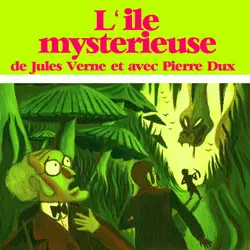
L'Île mystérieuse
Jules Verne
audiobookbook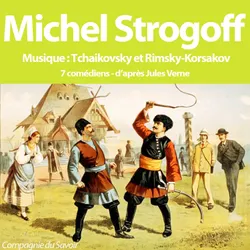
Michel Strogoff
Jules Verne
audiobookbook
Michel Strogoff
Jules Verne
audiobookbook
Voyage au centre de la Terre
Jules Verne
audiobookbook
michel strogoff
Jules Verne
audiobook
Voyage au Centre de la Terre
Jules Verne
audiobookbook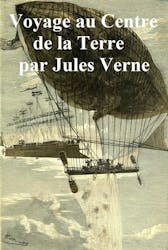
Voyage au Centre de la Terre
Jules Verne
book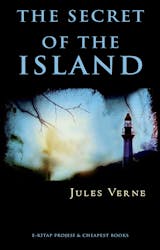
The Secret of the Island
Jules Verne
book
Twenty Thousand Leagues Under the Sea
Jules Verne
audiobookbook
Les conquistadors de l’Amérique centrale : Histoire des grands voyageurs
Jules Verne
book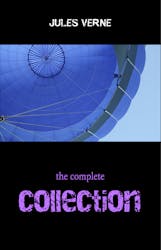
Jules Verne: The Collection (20.000 Leagues Under the Sea, Journey to the Interior of the Earth, Around the World in 80 Days, The Mysterious Island...)
Jules Verne
book
Twenty Thousand Leagues Under the Sea (Part 2)
Jules Verne
audiobook
- 1563 books
Jules Verne
Jules Verne (1828–1905) was a prolific French author whose writing about various innovations and technological advancements laid much of the foundation of modern science fiction. Verne’s love of travel and adventure, including his time spent sailing the seas, inspired several of his short stories and novels.
Read more - 1234 books
Mark Twain
Mark Twain, born Samuel Langhorne Clemens in 1835, left school at age 12. His career encompassed such varied occupations as printer, Mississippi riverboat pilot, journalist, travel writer, and publisher, which furnished him with a wide knowledge of humanity and the perfect grasp of local customs and speech manifested in his writing. It wasn't until The Adventures of Huckleberry Finn (1885), that he was recognized by the literary establishment as one of the greatest writers America would ever produce. Toward the end of his life, plagued by personal tragedy and financial failure, Twain grew more and more cynical and pessimistic. Though his fame continued to widen--Yale and Oxford awarded him honorary degrees--he spent his last years in gloom and desperation, but he lives on in American letters as "the Lincoln of our literature."
Read more - 783 books
Robert Louis Stevenson
Robert Lewis Balfour Stevenson was born on 13 November 1850, changing his second name to ‘Louis’ at the age of eighteen. He has always been loved and admired by countless readers and critics for ‘the excitement, the fierce joy, the delight in strangeness, the pleasure in deep and dark adventures’ found in his classic stories and, without doubt, he created some of the most horribly unforgettable characters in literature and, above all, Mr. Edward Hyde.
Read more - 298 books
James Fenimore Cooper
James Fenimore Cooper (1789–1851) was a prolific and popular nineteenth century American writer who wrote historical fiction of frontier and Native American life. He is best remembered for the Leatherstocking Tales, one of which was The Last of the Mohicans.
Read more - 1324 books
Edgar Allan Poe
Edgar Allan Poe (1809-1849) was an American writer, poet, and critic. Best known for his macabre prose work, including the short story “The Tell-Tale Heart,” his writing has influenced literature in the United States and around the world.
Read more - 1225 books
Jack London
Jack London (1876–1916) was a prolific American novelist and short story writer. His most notable works include White Fang, The Call of the Wild, and The Sea-Wolf. He was born in San Francisco, California.
Read more - 1736 books
Arthur Conan Doyle
Arthur Conan Doyle was a British writer and physician. He is the creator of the Sherlock Holmes character, writing his debut appearance in A Study in Scarlet. Doyle wrote notable books in the fantasy and science fiction genres, as well as plays, romances, poetry, non-fiction, and historical novels.
Read more - 292 books
Jonathan Swift
Jonathan Swift was born of English descent in Dublin, Ireland in 1667. He went to school at Trinity College in Ireland, before moving to England at the age of 22. After a short stint in the Anglican Church, he began his career as a writer, satirizing religious, political, and educational institutions. He wrote in defense of the Irish people, especially in his A Modest Proposal, which made him a champion of his people. His most famous work is Gulliver’s Travels which was published anonymously in 1726.
Read more - 75 books
Aldous Huxley
Aldous Huxley (1894–1963) is the author of the classic novels Brave New World, Island, Eyeless in Gaza, and The Genius and the Goddess, as well as such critically acclaimed nonfiction works as The Perennial Philosophy and The Doors of Perception. Born in Surrey, England, and educated at Oxford, he died in Los Angeles, California.
Read more - 931 books
H. G. Wells
English author H. G. Wells is best known for his work in the science fiction genre. He was also a prolific writer in many other genres, including contemporary novels, history, politics, and social commentary, even writing textbooks and rules for war games. He was born on September 21, 1866, and died on August 13, 1946.
Read more - 162 books
C. S. Lewis
Clive Staples Lewis (1898-1963) was one of the intellectual giants of the twentieth century and arguably one of the most influential writers of his day. He was a fellow and tutor in English Literature at Oxford University until 1954 when he was unanimously elected to the Chair of Medieval and Renaissance English at Cambridge University, a position he held until his retirement.
Read more - 547 books
H. P. Lovecraft
H. P. Lovecraft was an American author of horror, fantasy, and science fiction, especially the subgenre known as weird fiction.
Read more - 245 books
George Orwell
George Orwell, the pseudonym of Eric Arthur Blair, was born in Bengal, India, in 1903. He was educated at Eton, became a policeman in Burma but suffered and studied poverty. His great works, Animal Farm and Nineteen Eighty-Four, are a product of his hatred of totalitarianism. His legacy of writing and political thought is much admired today.
Read more - 503 books
Mary Shelley
Mary Shelley (1797–1851) was born to well-known parents: author and feminist Mary Wollstonecraft and philosopher William Godwin. When Mary was sixteen, she met the young poet Percy Bysshe Shelley, a devotee of her father’s teachings. In 1816, the two of them travelled to Geneva to stay with Lord Byron. One evening, while they shared ghost stories, Lord Byron proposed that they each write a ghost story of their own. Frankenstein was Mary’s contribution. Other works of hers include Mathilda, The Last Man, and The Fortunes of Perkin Warbeck.
Read more - 29 books
Lewis Grassic Gibbon
Lewis Grassic Gibbon (1901-1935) was the pen name of James Leslie Mitchell, one of the outstanding figures in Scottish literature. Acclaimed the world over for stories of great power and originality, his trilogy of novels A Scots Quair is his most renowned literary work. Gibbon was amazingly prolific and literally worked himself to death, producing seventeen books in seven years.
Read more - 24 books
Yevgeny Zamyatin
Yevgeny Zamyatin was born in Russia in 1884. Arrested during the abortive 1905 revolution, he was exiled twice from St. Petersburg, then given amnesty in 1913. We, composed in 1920 and 1921, elicited attacks from party-line critics and writers. In 1929, the Russian Association of Proletarian Writers launched an all-out attack against him. Denied the right to publish his work, he requested permission to leave Russia, which Stalin granted in 1931. Zamyatin went to Paris, where he died in 1937. Mirra Ginsburg is a distinguished translator of Russian and Yiddish works by such well-known authors as Mikhail Bulgakov, Isaac Babel, Isaac Bashevis Singer, and Fyodor Dostoevsky. Editor and translator of three anthologies of Soviet science fiction, she has also edited and translated A Soviet Heretic: Essays by Yevgeny Zamyatin, and History of Soviet Literature by Vera Alexandrova.
Read more
